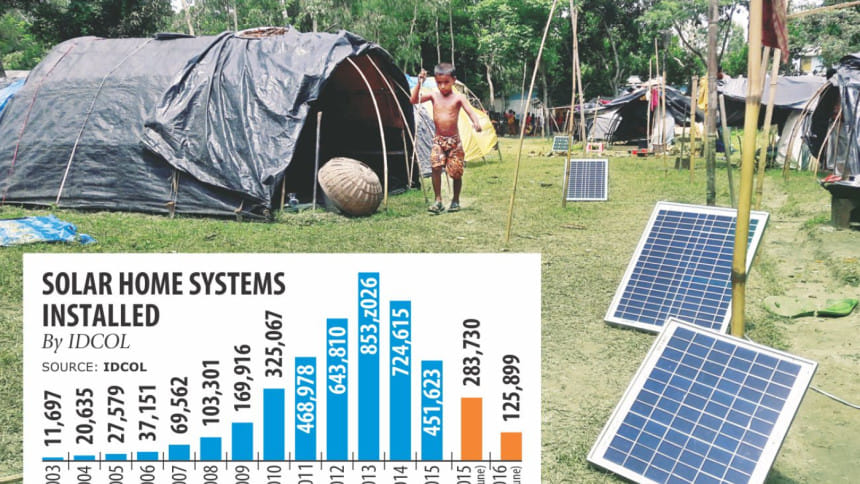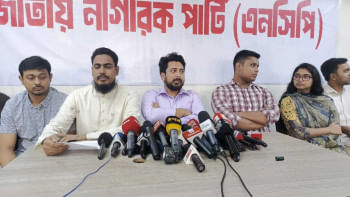Solar energy dims as grid power expands

Solar home system providers find their market squeezed due to the rapid expansion of electricity connections in off-grid areas, particularly by Bangladesh Rural Electrification Board (BREB), said industry stakeholders.
“Our sales declined in recent years for various factors including the expansion of grid electricity,” said Muhammad Ishaque, coordinator of solar programme at Integrated Development Foundation, a non-government organisation.
IDF is one of the 56 organisations that get low-cost finance from state-run Infrastructure Development Company Ltd (Idcol) to light up homes in off-grid areas with green electricity.
In recent years, BREB expanded its activities in many areas where there was no grid connection, leading to a decline in demand for solar home systems there, operators said.
In the last two fiscal years, BREB gave power connections to a total of 47.39 lakh users, which is almost the same number it managed in the preceding ten years.
Between fiscal 2004-05 and fiscal 2013-14, a total of 48.40 lakh connections were given.
Subsequently, the installation of solar home systems, which reached its peak in 2013, began declining from 2014. In 2013, 8.23 lakh systems were installed.
The number tumbled 38 percent year-on-year to 4.51 lakh in 2015, according to Idcol.
The situation changed further this year: in the first six months only 1.25 lakh units were installed, down 56 percent year-on-year.
“The operation area for solar home systems has declined significantly for BREB's expansion in recent years,” said Enamul Karim Pavel, head of Idcol's renewable energy.
Plus, there has been a slowdown in demand in areas where BREB is expected to provide connection in the next two years.
Idcol officials and market operators also blamed the unorganised marketers for selling what they termed 'inferior quality' solar panels at prices much below the rate offered by organisations with which Idcol works.
“There is a parallel market where sellers offer solar home systems for almost half the price that our partners can offer -- this has also affected the market,” Pavel said.
A significant number of solar home systems are sold by businesses not connected with Idcol, said Shahriar Ahmed Chowdhury, director of Centre for Energy Research at United International University.
All the factors have affected the instalment payments from recipients of the units, with the rate of recovery of Idcol's loans declining in recent times.
Many households that installed solar home systems started to become irregular with payments after getting electricity connections, officials said.
“It appears that the overall market has almost become saturated -- the prospect of fresh sales is not much,” Chowdhury said.
But Pavel said there is still some scope for expansion. There are some areas, such as river islands, where BREB would not go because of a lack of viability, he said.
The government's ongoing move to give solar home systems under Test Relief and Food For Work, two social safety net programmes, will also provide scope for businesses for some more years.
But the sole dependence on solar home system might not be enough for the businesses to survive in the long run.
Operators will have to go for solar-based irrigation and establish solar-based grid to survive, said industry insiders.
“Those who will be able to diversify businesses will survive,” said Chowdhury.
Bangladesh has installed 45 lakh units of solar home systems so far, which generate nearly 200MW of electricity, according to Sustainable & Renewable Energy Development Authority.

 For all latest news, follow The Daily Star's Google News channel.
For all latest news, follow The Daily Star's Google News channel. 



Comments